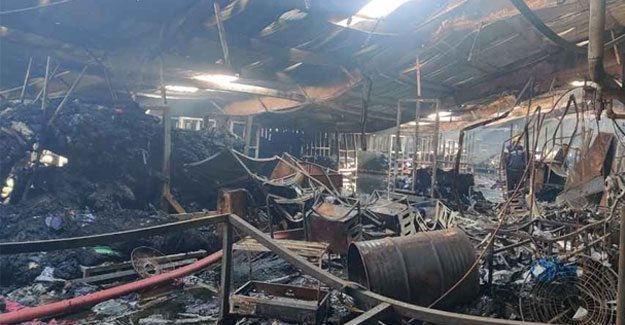
Nandan Denim Fire Highlights Lax Industrial Safety Norms In Textile Industry
The fire that claimed the lives of seven workers at the factory of Nandan Denim once again brings to light not just the horrific working conditions in the textile industry, but also the lax implementation of safety standards by certifying government departments, that more often than not work in connivance with large conglomerates. The poor working conditions would have continued at India’s largest denim manufacturer’s facility were it not for this incident. Even basic fire fighting equipment were found to be non-operational at this facility in Ahmedabad. And lives of workers had to be lost for government’s industrial safety department to wake up and take some action. Director Industrial Safety and Health (DISH), which functions under the Labour and Employment department, has issued a closure notice to Nandan Denim Ltd on Sunday after a major fire in its denim factory on Narol-Pirana Road. The fire had erupted in the factory on Saturday evening claiming seven lives. “We have issued a closure order to the facility so that more lives are not put at risk. We will review the safety aspects before allowing resumption of manufacturing operations,” said Vipul Mittra, additional chief secretary of Labour and Employment department. One would like to know if this would be a one time review, or would inspections in earnest be taken up at this and several other such facilities that exist in the country. Nandan Denim has said it will pay ex-gratia compensation of Rs 10 lakh each to the next of kin of the deceased workers. “Moreover, the company will provide a job to one family member of each of the deceased workers based on their qualification,” he added. Assistant Commissioner of Police (ACP) R.B. Rana, said a case of culpable homicide not amounting to murder was registered against the general manager of the factory, a whole-time director, a fire safety officer, and three others. Police have arrested the general manager, the fire safety officer and a whole-time director. Meanwhile, a fire department official said the fabricated shed structure of the factory godown had just one staircase with a narrow path without any air ventilation, which resulted in more number of deaths as the victims got trapped inside. “Besides, no fire safety equipment was found working,” he added. The cause of the fire is still under investigation, he said. Such negligence at one of India’s largest denim factories is shocking and raises the same questions again : Do work safety standards exist only on paper? How do these facilities pass industrial safety inspections? How do international retailers turn a blind eye to these working conditions while working hard to make factories of neighbouring Bangladesh safe for workers? How much does it cost the company to build a safe work environment? Nandan Denim has ties to major US retailers, according to its website. Nandan says it supplies jeans, denim and other garments to more than 20 global brands including popular retailers like Target, Ann Taylor, Mango and Wrangler, and its sister company supplies to Walmart and H&M. According to a report by Associated Press, some of the major brands including Ann Taylor, Target, Zara and Pull&Bear, said they are not customers and don’t have a relationship with Nandan Denim. Target said it is working to get its name off their website and out of their annual reports. Joe Fresh, the fashion brand created for Canada’s Loblaw Companies Ltd., said Nandan is not a supplier and doesn’t make their goods. But company officials said they believe one of their approved suppliers has purchased bulk quantities of denim from Nandan, and they are further investigating. Target and others did not respond to queries about whether their authorised suppliers may have purchased denim from Nandan. Zara’s parent company Inditex said Nandan Denim has produced 10,000 pairs of jeans for another of its brands, Lefties. Nandan Denim’s sister company Nandan Terry supplies towels and linens to many US stores including Walmart and H&M, according to ImportGenius shipping records. Those corporations said they would also look into the situation. Kontoor Brands, maker of Wrangler jeans, said they last worked with the factory in 2014. Amar Barot of the Textile Labour Association said working conditions in the textile factories across the city are grim, with rare inspections and few safety norms. “These incidents are irreversible and only strict monitoring by the government and its agencies can help prevent such disasters,” said Barot. He also said labour unions across the region have been declining over the last few decades, making it difficult for the voices of workers to be heard. Scott Nova, executive director of Washington-based Workers Rights Consortium, said: “It does not cost much to put fire exits in a textile factory. Brands and retailers are well aware of the safety risks in the garment and textile industry in India, yet they choose to do business with unsafe suppliers,” he said. “The result is that workers are losing their lives in factory disasters that could easily have been prevented.” Forty-three people died in a December fire at a factory which produced handbags, caps and other garments in New Delhi.
Textile Excellence
If you wish to Subscribe to Textile Excellence Print Edition, kindly fill in the below form and we shall get back to you with details.












